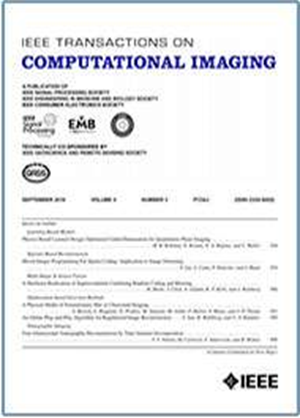用于减少 CT 金属伪影的 F2IFlow
IF 4.2
2区 计算机科学
Q2 ENGINEERING, ELECTRICAL & ELECTRONIC
引用次数: 0
摘要
计算机断层扫描(CT)已被广泛用于医疗诊断、评估以及治疗计划和指导。然而,如果患者体内存在金属植入物,图像质量就会大打折扣,从而影响临床诊断或放射治疗剂量计算。以往的金属伪影消除(MAR)方法要么需要事先了解金属植入物的相关知识,要么在伪影形成机制上存在建模偏差,从而限制了获取高质量 CT 图像的能力,增加了实际应用的复杂性。本文提出了一种基于特征到图像条件归一化流程(名为 F2IFlow)的新型 MAR 方法来解决这一问题。具体来说,我们首先设计了一种固有特征提取方法,以获取 CT 图像的固有解剖特征。然后,使用特征到图像流程模块,通过一系列可逆变换逐步完成无金属赝象的 CT 图像。将这些设计融入 F2IFlow,从粗到细的策略使我们的模型具备了提供卓越性能的能力。在模拟和临床数据集上的实验结果表明,我们的方法在定量和定性结果上都取得了卓越的性能,在减少伪影和图像保真度方面表现出更好的视觉效果。本文章由计算机程序翻译,如有差异,请以英文原文为准。
F2IFlow for CT Metal Artifact Reduction
Computed Tomography (CT) has been extensively utilized for medical diagnosis, assessment, as well as treatment planning and guidance. However, the image quality will be significantly compromised when metallic implants are present in patients' bodies, consequently affecting the clinical diagnosis or radiation therapy dose calculation. Previous Metal Artifact Reduction (MAR) methods either require prior knowledge about metallic implants or exhibit modeling bias in the mechanism of artifact formation, which restricts the capability to acquire high-quality CT images and increases the complexity of practical applications. In this paper, we propose a novel MAR method based on a feature-to-image conditional normalization flow, named F2IFlow, to address the problem. Specifically, we initially design an inherent feature extraction to get the inherent anatomical features of CT images. Then, a feature-to-image flow module is used for completing the metal-artifact-free CT images progressively through a series of reversible transformations. Incorporating these designs into F2IFlow, the coarse-to-fine strategy equips our model with the capability to deliver exceptional performance. Experimental results on both simulated and clinical datasets demonstrate that our method achieves superior performance in both quantitative and qualitative outcomes, exhibiting better visual effects in terms of artifact reduction and image fidelity.
求助全文
通过发布文献求助,成功后即可免费获取论文全文。
去求助
来源期刊

IEEE Transactions on Computational Imaging
Mathematics-Computational Mathematics
CiteScore
8.20
自引率
7.40%
发文量
59
期刊介绍:
The IEEE Transactions on Computational Imaging will publish articles where computation plays an integral role in the image formation process. Papers will cover all areas of computational imaging ranging from fundamental theoretical methods to the latest innovative computational imaging system designs. Topics of interest will include advanced algorithms and mathematical techniques, model-based data inversion, methods for image and signal recovery from sparse and incomplete data, techniques for non-traditional sensing of image data, methods for dynamic information acquisition and extraction from imaging sensors, software and hardware for efficient computation in imaging systems, and highly novel imaging system design.
 求助内容:
求助内容: 应助结果提醒方式:
应助结果提醒方式:


